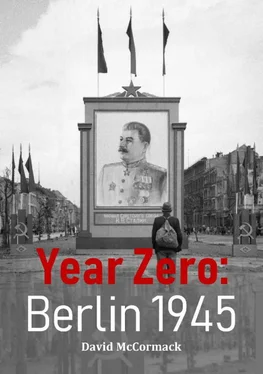In the early stages of the occupation the Allies worked in tandem to support the revival of cultural life in Berlin. The Soviet authorities of course had a head start. As early as 16 May, orders were issued granting permission for theatre performances to take place. On 18 May, the first classical music concert took place in the city. On the following day, some thirty of the surviving cinemas reopened. The theme of cultural revival was the basis of an interview by Amy Beal with former Berlin Philharmonic double bassist Erich Hartmann in 2006. When asked about the context of the cultural revival, Hartmann stated:
One of the miracles of this period was that, despite all of the unfortunate circumstances of the bombed-out cities, attempts were made to continue cultivating culture even while most concert halls, theatres and cinemas were destroyed. One didn’t just think of making money, rather that life should just go on.
Hartmann’s sentiments were not altogether uncommon, as there was a feeling that culture was essential for the nation’s spiritual survival in the wake of stories emerging concerning the scale of atrocities committed by the National Socialist regime in the people’s name. Experimental musician Arno Huth was unable to practice his art during the National Socialist era. The shattering defeat of May 1945 brought with it the uncertainties of occupation by the victorious powers. However, for people like Huth, it also brought new opportunities. Interviewed in January 1946, he stated:
After the surrender, hardly any opera groups or complete orchestras were left, nor were many theatres or concert halls usable because heavy bombings during the last months of the war had destroyed or badly damaged most buildings of any size. In spite of this, artistic life has picked up rapidly, thanks chiefly to aid from the Allied occupation forces.
Just how rapidly artistic and cultural life revived in Berlin can be demonstrated in the remarkable figure of some 120 premières being hosted in the city between July and December 1945. By early 1946, there were approximately 200 stages and halls available in the city for artistic performances. However, the co-operation of the Allied occupation forces was doomed to failure as long buried ideological differences came to the fore. Over the next two years, the various cultural instruments created by the four occupying powers began to mirror the increasing divide between east and west.
Chapter Fourteen
Hearts and Minds
The Allied sponsored cultural revival in Berlin was but one element in winning the battle for hearts and minds. Whilst the Western powers aimed to replace Hitler’s dictatorship with freedom of expression within a democratic multi-party system, Stalin had other ideas. His decision to send the German Communists back to Berlin represented his own attempt to win over the hearts and minds of the German people by creating a national party of the workers that would also appeal to the intelligentsia. His ultimate goal was to complete the revolution of 1848 by eliminating feudalism in a united Germany. The revolution would be subject to political control from Moscow. To this end, the so-called ‘Moscow emigrates’ were the perfect conduits for his planned social remodelling.
The group chosen for the mission was led by Walter Ulbricht. All were dedicated Communists and totally loyal to their masters in Moscow. By and large, Stalin and Beria regarded the group as no more than ‘useful idiots’. Nonetheless, Ulbricht and his group had something to prove as they had been subject to withering attacks regarding the German Communist Party’s lack of opposition to Hitler. The main task of the group was to support the Soviet occupation authorities and to convince the people that Stalin was their liberator, not their enemy. Little did the group know at this time of the terrible suffering of the civil population at the hands of their ‘liberators’. Their illusions would soon be shattered.
On 27 May 1945, the group arrived in the devastated city. Such was the level of destruction that greeted them, that their task appeared at first to be utterly futile. Markus Wolf (later head of intelligence) was a member of the group. Given the pseudonym ‘Michael Storm’, he worked as a journalist and propagandist for a Soviet controlled radio station. The topics of rape, the fate of German prisoners of war in the East and the future boundary lines with Poland were never to be broadcast. As these were all topics which were of intense interest to the German population he was able to quickly glean from numerous sources the full picture of what the early stages of the Soviet occupation had meant. In his diary he wrote:
Our frontoviki have wrought havoc. All women raped. Berliners have no more watches… Then came the experience, the reality, and as a result the absolute majority of Germans, especially those east of the Elbe, were very, very anti-Soviet.
Wolf’s reflections accurately characterise the prevailing mood amongst the population. Yet, none of this mattered to Ulbricht, his immediate superior. This charmless, ambitious and unscrupulous individual was totally guided by his loyalty to Stalin and Soviet policy.
The goals of the German Communist Party had been laid out as, ‘The establishment of an anti-fascist, democratic republic with all democratic rights and freedoms for the people’. However, Ulbricht’s vision was somewhat different. His plans for the new Germany were based around authoritarian leadership and strict controls over all elements of civil society. Nonetheless, he understood the requirement for a democratic façade, stating that, ‘It must appear democratic, but we must control everything’. Ulbricht went on to create the foundations for a virtual dictatorship by pressurising the Social Democrats to merge with the Communists (on his terms) which subsequently led to the creation of the Socialist Unity Party of Germany. Ulbricht’s dictatorship marked the beginning of a new era in German politics. A line had been drawn under the National Socialist era. With the establishment of incompatible systems of government in those areas of Germany controlled by the democratic powers in the West and the Soviet Union in the East, a new era had begun.
Chapter Fifteen
The Balance Destroyed
To the general public in America and Great Britain, Stalin was known by the affectionate title of ‘Uncle Joe’. This appellation gave the impression that the Soviet leader was a genial, benevolent figure whose life and work was devoted to serving the interests of his people. In reality, nothing could have been further from the truth, as behind his somewhat unremarkable and benign appearance lay almost unfathomable levels of viciousness and jealousy which arose from his love of power. Wearied to near exhaustion by the demands of war, Stalin was nonetheless determined to rebuild his shattered state. Therefore, the last thing he wanted was another war. The engine of history would take care of the capitalist nations in due course.
Stalin firmly believed that time was on his side, as the greedy and rapacious Americans and British would enter into conflict with each other as they sought to dominate world trade. All he had to do was sit back and wait for the inevitable clash which would result in the destruction, or the fatal weakening of these rival powers, then, and only then would a rejuvenated Soviet state step in to claim the spoils. His thinking was clearly influenced by Marxist-Leninist ideology which argued that capitalist states could only cooperate for a limited period as their self interests would inevitably come to the fore sooner or later. Stalin remained stubbornly wedded to the dialectics of Marxist-Leninist ideology. His assertions regarding the inevitability of a clash between competing capitalist states were published in Pravda :
Читать дальше












